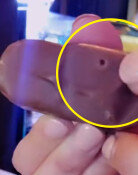Heart-breaking withdrawal from the North
Heart-breaking withdrawal from the North
Posted April. 29, 2013 06:55,
Good job.
At the Inter-Korean Transit Office at 4:20 p.m. Saturday, Park Yoon-gyu, CEO of the textile company Fine Renown, greeted Choi Yeon-sik, the head of the companys branch office at the Kaesong Industrial Complex, with hug and tears. Choi, who came home after 26 days of staying in the North, also burst into tears while saying, I wanted to protect the company... When asked what they thought about the situation, they said Its sad with a sigh and gazed at the sky.
Chois car still had its license plate from Kaesong because he didnt have time as things moved so fast. His car was filled with products from inside to outside, including the trunk, bonnet and the top of the car. Except the windshield, all the other places of his car were loaded with products wrapped around by tapes. Due to the heavy weight, the ceiling of his car even sank. It took 12 hours only for packing. I brought 3,000 pieces of finished products, but more than 20,000 are left in the North. Due to too much stress I got endured these days, I will go to hospital for checkup tomorrow.
On Saturday, 126 South Koreans who had stayed at the inter-Korean complex came home at 2:40 p.m. and 4:20 p.m. through the Inter-Korea Transit Office. They were originally expected to arrive at the South from 2 p.m. The headquarter head of another textile company said, Only the products finished with export declaration are allowed to be carried out from the North. It took long time to get through customs check. Some workers packed even products without the declaration while hurrying to leave due to the abrupt withdrawal decision. Several companies were asked to pay fines by customs examiners of the North. Remaining 50 South Korean workers with Korea Electric Power Corporation and KT maintaining the facilities in the industrial complex will come home Monday.
Some workers returned from the complex said, Unlike some media reports, the atmosphere in the Kaesong Industrial Complex was peaceful. Yet another textile company head said, Since late last month North Korean soldiers began to wear a disguising robe plugged with branches of tress, but there was no threat toward us. We had ramen for each meal not because we ran out of rice but because side dishes ran out. We couldnt eat just rice. Being bushy beard for not shaving for a while, he continued saying, As workers from different companies stayed together, the only thing we were concerned about was whether any company might bankrupt in the mean time.
Business owners at the Kaesong Industrial Complex are deeply concerned that North Korean would freeze or confiscate their assets there. Jeong Ki-seop, chairman of SNG, a company operating a plant in the complex, said, When the tour of Mt. Kumgang was stopped, it was the North who expelled South Koreans. But this time, our government decided the withdrawal of South Korean workers, which means that the South has provided the North with excuses to confiscate everything from raw and sub materials to equipment. Including equipment, finished goods, raw and sub materials and compensations for buyers, the total amount of loss can exceed 4 trillion won (3.6 billion U.S. dollars).
How to survive now is a big problem for the entrepreneurs who have plants in the complex. A textile company whose entire production equipment is in Kaesong stopped manufacturing from April 9 when North Korean workers were pulled out. The company head said, Even if we find a factory in Korea or abroad, it would take one month to make finished goods, from dyeing raw and sub materials to processing them. Even if we make cloths, we wont be able to sell them because the season is already over. We just can`t do anything now.
whalefisher@donga.com
Headline News
- Med professors announce intention to leave hospitals starting Thursday
- Bridge honoring Sgt. Moon Jae-sik unveiled in Pennsylvania
- Chief of Staff Chung tells presidential secretaries to stay away from politics
- US FTC bans noncompete agreements
- N. Korea launches cyberattacks on S. Korea's defense companies







